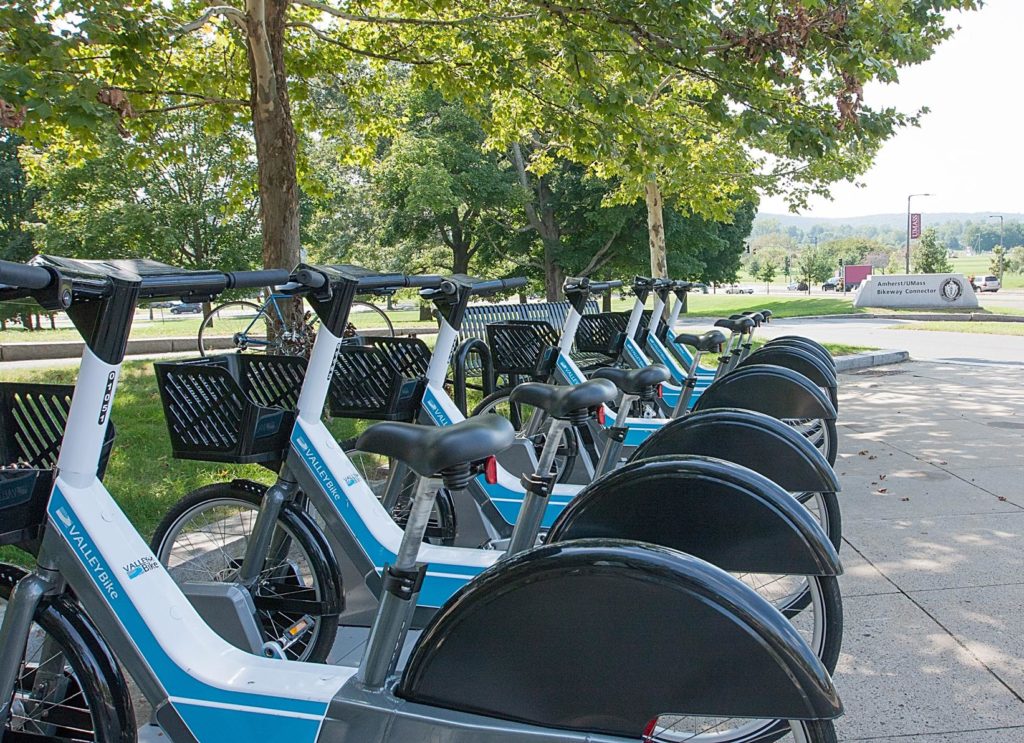Opinion: Local And Green (#22, Part 2). Towns Moving From Planning To Acting On Climate

Vslley Bikes at UMass Amherst. Photo: umass.edu

This article appeared previously in the Amherst Bulletin.
Part 1 of this column covered municipal best practices in the areas of Zero Energy Ready-buildings, electricity powered by renewable energy, and battery storage and microgrids.
Part 2 looks at towns leading on fossil fuel-powered vehicles, green technology and education, Zero Waste, and Environmental Justice.
Many municipalities, like Amherst, have used the Municipal Vulnerability Preparedness program to help fund the creation of a Climate Action Plan. And more and more municipalities have now moved on and are taking innovative actions to accelerate emissions reduction.
Transition Off Fossil Fuel-Powered Vehicles
Towns are replacing fossil fuel-powered vehicles with electric or alternate fuel-powered vehicles in their fleets. Amherst is purchasing an ambulance that doesn’t burn fossil fuel when idling. Concord has obtained funding for a second electric school bus. The Martha’s Vineyard Transit Authority has introduced 12 electric buses into its fleet and plans to replace its remaining diesel buses with electric models. In New Bedford, more than 25% of the city’s passenger fleet has been converted to electric vehicles, which is believed to be the highest percentage of electric vehicles in any municipal fleet in Massachusetts.
Ensuring safe bicycling and pedestrian networks has risen in importance. In the Pioneer Valley, the ValleyBike Share program offers an affordable and green alternative transportation network, with more than 500 bicycles available in six communities.
In Cambridge, bicycling is encouraged. The Cycling Safety Ordinance requires streets undergoing significant roadwork to include protected bike lanes in their design if they are part of the city’s priority bicycle route network..
Green Technology And Education
Somerville is home to Greentown Labs, an incubator that hosts more than 40 clean tech start ups and is a national leader in developing the next generation of sustainable technology. In 2015, Somerville announced its Somerville Green Tech program, allowing green technology innovators to partner with the city to adopt their technology on municipal properties.
In Northampton, Smith Vocational and Agricultural High School offers courses on renewable energy technology and theory, giving its students the skills to join a growing industry.
Zero Waste
Communities in MassachusettsA are looking to reduce waste by limiting single- use plastic and transforming their hauler systems so that they can have more control. Trash can be limited by paying per bag or container, recycling can be increased, and composting can be made more available and convenient for residents.
Cambridge has incorporated curbside composting for residents in its basic service. Newburyport facilitates the use of local non-profit compost companies.
Hamilton and Wenham, MA recently became the first towns in MassachusettsA to require curbside compost service by banning organics (compost) in the waste stream. Compost is useful and even profitable when processed. Their removal from the waste stream reduces waste by as much as 35%.
Community Campaigns/Environmental Justice
Amherst may be on the forefront of environmental justice by its recent outreach and inclusion of BIPOC community members in creating its climate action plan. BIPOC community members were sought out and included in each sector working groups of building heating and electricity, transportation, waste and land use. Participants were paid for their time and input.
Concord, Lexington, and Wayland have initiated community interactive dashboards, using a format provided by MassEnergize, givingwhich give residents the opportunity to contribute to the effort to reduce emissions and to feel a sense of community.
Observing that many residents still face obstacles to switch to solar, Newton has developed a community shared- solar program that enables residents to benefit from a solar installation in a central location.
It is gratifying that initiatives and technologies that once seemed far-fetched — like microgrids, net zero energy buildings, and electric transit buses — are now becoming commonplace.
This month, Amherst will be unveiling its Climate Action, Adaptation and Resilience Plan, this month which will lay out a roadmap for climate action implementation. To repeat the mantra: The time for climate action planning is over. The time for action is Now.
Darcy DuMont is a founding member of Western Massachusetts Community Choice Energy, a member of the Amherst Energy and Climate Action Committee, and an Amherst Town Councilor representing District 5. Views expressed are hers and not those of the Town Council.
